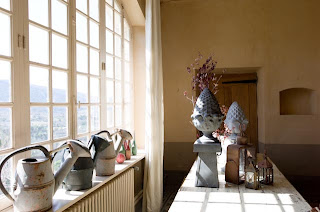Arrivals and Departures - 26 March 2011
26th March, 2011
We’ve been in the Luberon for 2 days with new friends, sharing our lives over dinner by their fire or lunch at a local market town. We met them because of a whale-bone, actually the rib of a whale, which I had purchased in Soho from Paula Rubenstein’s shop. Paula is a remarkable woman who evidently has as intuitive an eye for people as she does for objects. I bought the whale’s rib for our NY living room, just a couple of weeks before we left, turning it into a wall sculpture that catches the light from the Hudson River.
When I tell Paula about our book project she says, Oh, you must get in touch with Sharon and Paul who live part of the year in Provence. And I do. It’s a first for me, reaching out to strangers via the internet. Sharon and I begin an email correspondence that convinces us we are destined to meet. And so we find ourselves in their ancient, palatial yet authentic apartment in Bonnieux.
On the second day, Joel and I take off for the afternoon to work and will rejoin them for dinner, once again, by their fire. We drive along the back roads of the valley. It is very quiet in the car. We are looking. Looking. We came here to lose ourselves and yet we find, of course, that that is impossible. Every blade of grass, every river, every moon is part of who we are. We pass a field of uprooted trees and they feel like my tribe. Who, what, yanked them from the soil and lay them down to die? And is that what frightens us about having uprooted ourselves, that we, too, will lay down and die?
Lavender rows well before they bloom, probably the only picture I'll make of lavender!
A wall in the town of Rousillon where the hills are red clay.
Early this morning the four of us climbed the stone steps to the top of the village to where the 12th Century church stands rooted to its spot.
From its tower the four bells are being slowly tolled, not in any recognizable rhythm and yet the rhythm is all about recognition, for the bells toll for a local man whose funeral we look down to in the valley. We see the mourners gathering. The door of the hearse is open and even from this distance you can see the coffin. The bells, each solitary tone, gasp and gasp again as if the bell ringer is listening for eternal vibration. The last note sounds and we go into the church. I try, in my lacking language, to tell the bell-ringer how moved I am by the sounds he made. He tells us they were the sounds of the last breaths leaving the body.
I look once more down into the valley of no shadow. Only blue skies and sunlight and the music of the heavens wave the departed villager on to his next journey.
A place for everything and everything in its place.









